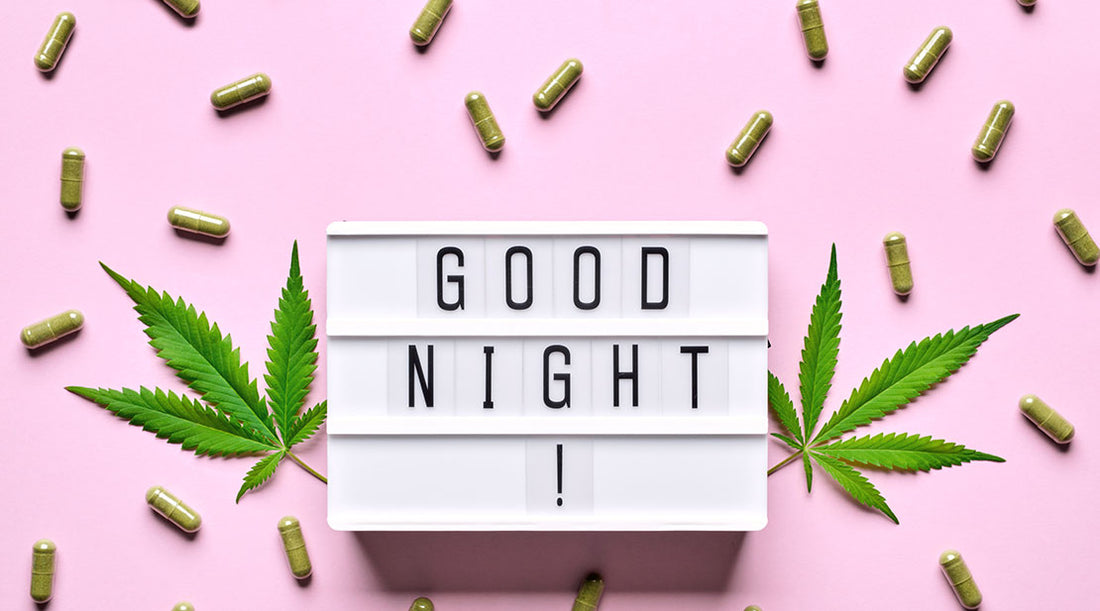Table of Contents
CBD for Sleep: Potential Benefits and Usage
People feel stressed and exhausted when they cannot sleep well at night. They may lie in bed for hours, tossing and turning, counting sheep in an attempt to fall asleep, but to no avail. If this is something familiar to you, read on. This article explores the question: Can CBD help improve sleep quality? By examining existing research, we aim to clarify CBD's efficacy for various sleep-related issues. We will explore its benefits in treating insomnia, regulating circadian rhythms, alleviating anxiety, and managing chronic disorders. We will also guide you on effectively incorporating CBD into your sleep routine, including dosage recommendations and different product options available on the market.
Evidence-Based Benefits: Research Supporting CBD for Sleep
Due to their properties, CBD products have a wide range of applications and positive effects on the body as a whole. CBD, a natural compound found in hemp plants that has a highly beneficial impact on improving the functioning of the human body.
A significant milestone in exploring CBD's potential for insomnia treatment was reached in 2022 with the publication of a systematic review that provided a critical appraisal of the available evidence in the existing literature on the therapeutic benefits of CBD in the treatment of insomnia.
The conclusions of this systematic review state that CBD, either alone or mixed with equal amounts of THC, has potential efficacy in alleviating insomnia symptoms. The findings suggest promising results in the use of CBD for sleep management. However, the review emphasises the importance of further research to consolidate these findings. In particular, there is a call for research targeting insomnia populations and using subjective and objective evaluation measures.
In a 2024 randomised controlled trial, 1,793 adults experiencing symptoms of sleep disturbance were randomly assigned to receive a 4-week supply of one of six capsule products. The capsules contained either 15 mg CBD or 5 mg melatonin, either alone or in combination with minor cannabinoids.
The trial's findings suggest several noteworthy conclusions. Chronic use of a low dose of CBD was found to be safe and showed the potential to improve sleep quality among participants. However, it is essential to note that the observed effects of CBD did not exceed those of 5 mg melatonin, a commonly used sleep aid.
Additionally, the trial investigated the inclusion of low doses of minor cannabinoids such as CBN (cannabinol) and CBC (cannabichromene) in the formulations containing CBD or melatonin isolate. The study found that including minor cannabinoids did not significantly enhance the effects of formulations containing CBD or melatonin alone.
The randomised controlled trial provides valuable insights into CBD's safety and potential efficacy in improving sleep quality. Still, additional research may be necessary to investigate its comparative effectiveness with established sleep aids like melatonin, the function of minor cannabinoids in sleep formulations, and their potential synergies with CBD and melatonin.
CBD's Advantages in Sleep Enhancement:
- Insomnia: According to the research, CBD has shown promise in addressing insomnia by promoting relaxation and reducing symptoms that inhibit sleep onset. CBD may interact with brain receptors responsible for regulating sleep-wake cycles, thereby improving sleep duration and quality.
- Circadian Rhythms: Based on the research findings, CBD modulates the release of certain neurotransmitters and hormones, which may help synchronise the body's internal clock, known as the circadian rhythm.
- Anxiety can often cause sleep disturbances, making it challenging to achieve restful sleep. According to the 2015 research, CBD has anxiolytic properties, which means it can potentially help alleviate feelings of stress and anxiety. By reducing anxiety levels, CBD may facilitate relaxation and create an optimal mental state for falling asleep more easily.
- Chronic pain conditions and neurological disorders can significantly impact sleep quality. CBD's anti-inflammatory along with its analgesic properties make it a promising adjunctive therapy for managing pain-related sleep disturbances.
It is important to note that CBD should not be used as a substitute for the medical treatment of chronic diseases.
How much and when to take CBD oil for sleep?
It is important to consider factors such as potency, administration method, and personal preferences when selecting CBD products to promote sleep. The following are some commonly used CBD products:
- CBD oil for sleep and relaxation is a versatile and easy-to-use option.It can be taken sublingually for faster absorption or added to food or beverages. Look for full-spectrum or broad-spectrum oils, which contain additional beneficial compounds from the hemp plant. CBD capsules offer athe most convenient and precise way to consume CBD, as they’re pre-measured, making it easy to track your dosage.
- CBD gummies for sleep or edibles provide a tasty and discreet option for consuming CBD. They come in pre-measured doses and are ideal for those who prefer a more enjoyable way to take their supplements. Look for gummies formulated for sleep with added ingredients like L-theanine or valerian root.
- Additionally, CBD topicals may also be considered. Although CBD topicals such as creams or balms are not typically used for sleep, they can be applied to targeted areas of the body to alleviate discomfort that may interfere with sleep, such as muscle tension or joint pain.
- Vaping CBD through a vape pen provides a rapid absorption into the bloodstream, making it a quick-acting option for addressing acute sleep issues or sudden insomnia episodes. However, consider the potential risks associated with vaping and to select high-quality, lab-tested products.
Tips for Choosing CBD Safely and Understanding Side Effects
When shopping for the best CBD oil for sleep, ensure it complies with industry standards by checking for certifications and licenses. These may include
- Good Manufacturing Practices (GMP) Certification, ensures products are manufactured according to the strict quality control standards
- Third-party lab testing verifies CBD products' potency, purity, and safety, and these Certificates of Analysis (COAs) must be easily accessible to consumers.
- When purchasing organic CBD products, consumers should look for certifications such as USDA Organic or Certified Organic, which indicate that the products have been produced without synthetic pesticides or fertilisers.
The World Health Organisation states, CBD is generally safe and well-tolerated by most individuals, with few reported side effects due to drug intervention. Few factors to ensure a safe and positive experience with CBD:
- Before incorporating CBD into your wellness routine, speak with a healthcare professional, especially if you have underlying health conditions or are taking medications.
- Start with a low and gradually increase the dose as needed when beginning a CBD regimen. This allows you to track your response to CBD and minimise the risk of adverse effects.
- Monitor for any potential side effects (dry mouth, drowsiness, or changes in appetite or mood). If any adverse reactions occur, be sure to discontinue use and consult a healthcare professional.
- Special Populations:
- ➤ Before giving CBD to children, consult a paediatrician. CBD’s safety and efficacy in pediatric populations are not well-established.
- ➤ Pregnant and nursing individuals should avoid CBD as it carries risks to the developing fetus or infant.
- ➤ Older adults should take into account any age-related changes in metabolism, as well as potential interactions with medications. Individuals must consult a healthcare professional before using CBD.
Summing Up
In this article we looked at the available researches on CBD's potential efficacy in managing insomnia, which highlight CBD's promising benefits and areas for further investigation. Additionally, the article explores studies on combining CBD and melatonin, revealing their complementary roles in promoting sleep quality. Before incorporating CBD or melatonin into your sleep regimen, consult with a healthcare practitioner to ensure that they are safe and suitable for your individual needs.
Sources:
- Use of Cannabidiol in the Management of Insomnia: A Systematic Review
- The Safety and Comparative Effectiveness of Non-Psychoactive Cannabinoid Formulations for the Improvement of Sleep: A Double-Blinded, Randomized Controlled Trial
- Cannabidiol affects circadian clock core complex and its regulation in microglia cells
- The anti-inflammatory effects of cannabidiol and cannabigerol alone, and in combination
- Cannabidiol (CBD)





